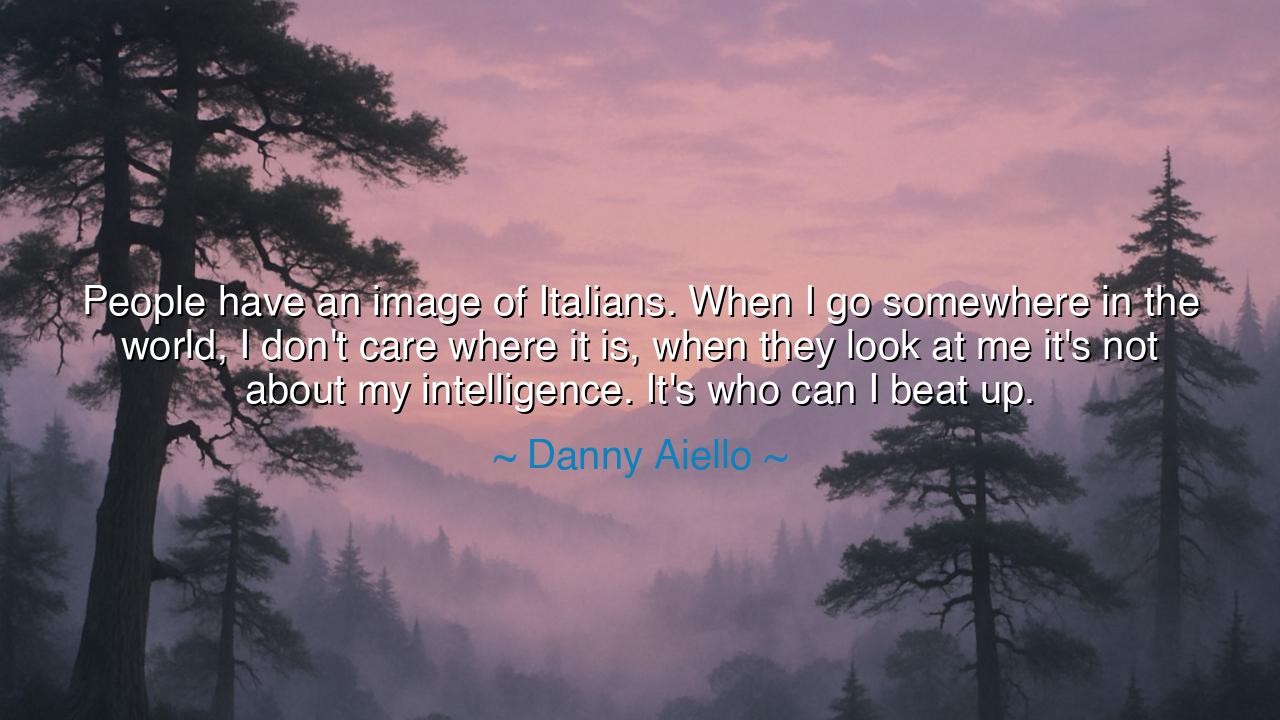
People have an image of Italians. When I go somewhere in the
People have an image of Italians. When I go somewhere in the world, I don't care where it is, when they look at me it's not about my intelligence. It's who can I beat up.






The actor and storyteller Danny Aiello, a man forged in both hardship and heart, once said: “People have an image of Italians. When I go somewhere in the world, I don’t care where it is, when they look at me it’s not about my intelligence. It’s who can I beat up.” These words, though spoken plainly, echo with deep sorrow and defiance. Beneath their surface lies the cry of one who has lived under the shadow of stereotype, who has seen how the world can flatten the fullness of a person into a single image. Aiello’s voice carries the weary wisdom of all those who have struggled against prejudice — the invisible wall built not of truth, but of perception.
For Aiello, the image of Italians was a double-edged sword. On one side lay pride — the warmth of family, the passion for life, the strength of community; but on the other side lay distortion — the world’s fascination with violence, temper, and machismo. His fame as an actor often placed him in roles of toughness and grit, yet within him lived sensitivity, artistry, and reflection. He was a poet trapped in the armor of a fighter, a thinker misread as a brute. Thus, his lament is not merely personal, but universal. It is the voice of every soul who has been judged not by their mind or heart, but by the shape of their face, their accent, their heritage.
History is filled with such misjudgments. Consider Socrates, the philosopher of Athens. In his time, many mocked him for his rough appearance and unrefined speech. They saw only an eccentric old man, not the vast intelligence that sought truth in every question. They condemned him, not because he lacked wisdom, but because they failed to see it through their own preconceptions. So too has humanity often mistaken strength for savagery, humility for weakness, and passion for danger. The eyes that judge too quickly cannot see the soul within.
When Aiello speaks of being seen as one who could “beat up” rather than one who could think, he exposes a cruel paradox — that society often fears what it cannot understand, and so reduces it to something simple, something it can control. The Italian-American man, like so many others of immigrant blood, carried within him a proud heritage — of builders, dreamers, laborers, and philosophers. Yet the media and the masses painted a single portrait: the gangster, the tough guy, the man of fists, not of thought. Aiello’s words are not complaint, but testimony — testimony to the human cost of misunderstanding.
Yet there is also a deeper strength in his statement. For though he acknowledges the pain of being misjudged, Aiello never denies who he is. His tone carries a kind of defiant dignity. He does not reject his image — he reclaims it. If the world sees him as strong, then let them know that strength is not brutality, but endurance; that courage is not violence, but integrity. In this, he transforms the insult into armor, turning stereotype into symbol. What was meant to diminish him becomes a badge of survival.
Such transformation is the work of the wise. Consider Frederick Douglass, who was once viewed by his oppressors as little more than property. They saw his body but not his mind, his labor but not his spirit. Yet Douglass shattered their image through the power of his intellect and eloquence. He showed the world that intelligence and dignity know no race, no nation, no class. Aiello’s struggle is of the same lineage — the eternal battle to be seen as whole, to reclaim one’s humanity from the narrow gaze of others.
So let the teaching of Aiello’s words be remembered: Do not allow the world’s image of you to define you. Others may see only fragments, but you must live as the whole. Be proud of your roots, yet refuse to be imprisoned by them. When you are judged, do not shrink; instead, stand taller, and let your actions reveal the truth that false vision cannot. The greatest revenge against stereotype is not anger, but authenticity — to live so fully, so wisely, that the image dissolves before the reality of your being.
And to those who look upon others with quick eyes and shallow judgment, learn this: to see truly is to see deeply. Every man and woman carries more than a face, more than a name, more than a rumor of culture. Seek the soul beneath the surface, for there lies the richness of humanity. In this way, Aiello’s lament becomes not only his own, but a mirror for all of us — a reminder that every heart desires to be known, not as a type, but as a person. For the world will be healed not by power or pride, but by the courage to look beyond the image, and to finally see each other as we truly are.






AAdministratorAdministrator
Welcome, honored guests. Please leave a comment, we will respond soon